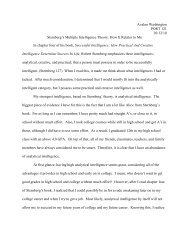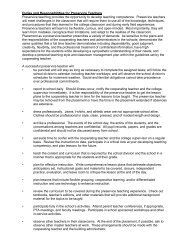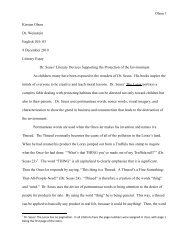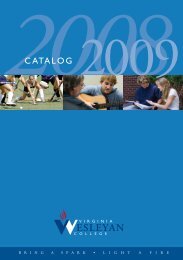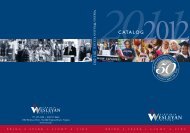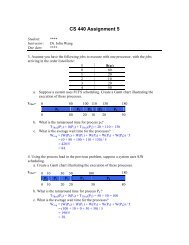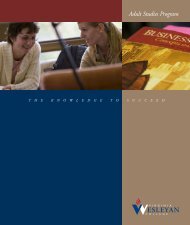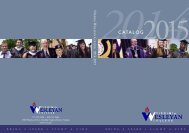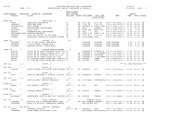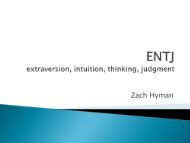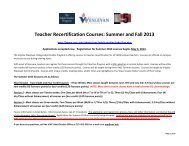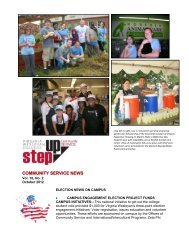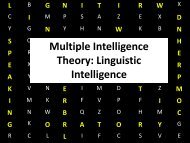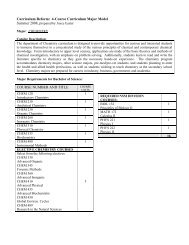2013-2014 Catalog - Virginia Wesleyan College
2013-2014 Catalog - Virginia Wesleyan College
2013-2014 Catalog - Virginia Wesleyan College
- No tags were found...
You also want an ePaper? Increase the reach of your titles
YUMPU automatically turns print PDFs into web optimized ePapers that Google loves.
136 MUSICMUSIC137102 Basic Musicianship with Guitar (4) ANo previous musical experience is necessary, butbasic fundamentals of music notation (pitch andrhythm) are taught. Students learn to make musicfrom a written score using the guitar. Students mustown their own instrument. Students may not receivecredit for MUS 102 if they have already taken MUS101. Offered fall of even-numbered years.110 A World of Music (4) AStudents listen to music as it exists in the realworld, exploring the diversity of the world’s music toacquire a sense of what exists beyond their ownexperience. Students learn about American folk,religious, jazz, popular, and ethnic music, as well assome world music. The course concludes with athorough overview of Western classical music.Offered fall of odd-numbered years.201 Music & Art in the Western World (4) AExplores the traditions of music, painting,sculpture, and architecture of the Western world.Beginning with the Greeks and continuing throughthe present, many individual works from importantart periods are introduced. Discussion topics includehow the arts reflect the sociocultural conditions oftheir time and place, how media are used, and howthe elements in each art form contribute to theaesthetic response. Identical to ARTH 201.213/313 Music History I (4) AA chronological study of music from its originsthrough the early 18th century. A research project andsome analysis are required for MUS 313.Prerequisites: MUS 100, 201, or consent. Offered fallof even-numbered years.214/314 Music History II (4) AA continuation of MUS 213/313 from the 18thcentury to the present. Prerequisite: MUS 100, 201,213/313, or consent. Offered spring of oddnumberedyears.225 Intermediate Musicianship I (4)A study of music theory, sightsinging, and eartraining as part of a program to develop completemusicianship. Music theory is the logical andsystematic study of the rationality of music thateventually justifies and broadens natural musicalinstincts and intuitions. Sightsinging and ear trainingenhance the musician’s ability to envision the soundof a musical composition from an examination of theprinted score. Includes elementary harmony andanalysis, modes, triads and inversions, melodicconstruction, and simple harmonization withprimary and secondary triads. Prerequisite: ability toread music notation. Offered fall of even-numberedyears.226 Intermediate Musicianship II (4)A study of music theory, sightsinging, and eartraining are part of a program to develop completemusicianship. Music theory is the logical andsystematic study of the rationality of music thateventually justifies and broadens natural musicalinstincts and intuitions. Sightsinging and ear trainingenhance the musician’s ability to envision the soundof a musical composition from an examination of theprinted score. Includes elementary harmony andanalysis including modes, triads and inversions,melodic construction, and simple harmonizationwith primary and secondary triads. Prerequisite:ability to read music notation and a grade of C orhigher in MUS 225. Offered spring of odd-numberedyears.250/350 Music from the Baroque Era(1600-1750) (4) AA listening course exploring music from theBaroque. Students listen to works from this period intheir entirety and discover how this music reflects thecultural history of the era. Works by Vivaldi,Couperin, Scarlatti, Handel, Bach, and others areincluded. Students have the opportunity to attendselected live performances as part of their coursework. Offered fall of even-numbered years.251/351 Music in the Classic Era(1750 to 1825) (4) AA listening course exploring music from theClassic era. Students listen to works from this periodin their entirety and discover how this music reflectsthe cultural history of the era. Works by Haydn,Mozart, Beethoven, and others are included. Studentshave the opportunity to attend selected liveperformances as part of their coursework. Offeredspring of odd-numbered years.252/352 19th-Century Music (4) AA listening course exploring music from the 19thcentury. Students listen to works from this period intheir entirety and discover how this music reflects thecultural history of the era. Works by Beethoven,Schubert, the Schumanns (both Clara and Robert),Chopin, Liszt, Verdi, Berlioz, Brahms, and others areincluded. Students have the opportunity to attendselected live performances as part of their coursework.Offered fall of odd-numbered years.253/353 20th-Century Music (4) AA listening course exploring music from the 20thcentury. Students listen to works from this period intheir entirety and discover how this music reflects thecultural history of the era. Works by Debussy, Ravel,Puccini, Bartok, Stravinsky, Schoenberg, Ives,Copland, Varèèse, Barber, Glass, Gorecki, Pärt,Zwilich, and others are included. Students have theopportunity to attend selected live performances aspart of their coursework. Offered spring of evennumberedyears.310 Topics in Sacred Music (4)An in-depth study of some aspect of sacred musicincluding, but not limited to, hymnology and sacredchoral literature, sacred music history, and choraldirecting, all within the context of a variety ofreligious traditions. Offered each semester.321 Conducting Techniques (4)Offers basic and advanced skills for choral andinstrumental conductors. Includes all conductingpatterns, instrumental and choral techniques,rehearsal technique, and score study. Prerequisite:MUS 226, APMU 111, 211, or equivalent. Offeredon demand.325 Advanced Musicianship I (4)A continuation of MUS 225 and 226. Focuses ona wide range of musical styles from the Renaissance tothe present. More complex chords and larger formssuch as the fugue, rondo, theme and variations, andsonata are studied. Various strategies for analyzingmusical compositions are investigated. Postimpressionistand serial composition techniques areincluded. Theoretical analysis and study areaccompanied by parallel exercises in sightsinging andear training. Prerequisite: MUS 226. Offered fall ofodd-numbered years.326 Advanced Musicianship II (4)A continuation of MUS 225 and 226. Focuses ona wide range of musical styles from the Renaissance tothe present. More complex chords and larger formssuch as the fugue, rondo, theme and variations, andsonata are studied. Various strategies to analyzemusical compositions are investigated. Postimpressionistand serial composition techniques areincluded. Theoretical analysis and study areaccompanied by parallel exercises in sightsinging andear training. Prerequisite: MUS 226. Offered springof even-numbered years.354 VocaI Music Methods and Materials (4)Designed for students seeking certification inmusic education, this course covers facets of vocalmusic education in Elementary, Middle and HighSchool areas. This course also serves as preparation forthe Praxis II Music Content Knowledge test.Prerequisite: MUS 321. Offered spring of evennumberedyears.480 Senior Project (2)The culminating experience in the music major.Students present a formal recital or write an historicalor critical thesis. Using music selected from eachmajor historical period, they demonstrate their abilityto apply knowledge gleaned from the study of musichistory and music theory to their interpretations orinvestigations of the chosen repertoire. Studentselecting to perform a recital take MUS 480concurrently with the final semester of applied musicstudy and receive 2 semester hours. Students writinga thesis receive 4 semester hours. Prerequisite: gradesof C or higher in MUS 313 and 325. Prerequisites/corequisites: MUS 314 and 326.APPLIED MUSIC COURSES(APMU)111 <strong>Wesleyan</strong> Singers (1) A*Offered as a cultural experience for any student ofthe college. A wide variety of choral literature isstudied and performed, occasionally accompanied bya professional orchestra. Offered each semester. *Foursemester hours must be completed to fulfill thegeneral studies requirement.113 Class Voice (2) A*Offered in conjunction with APMU 211, <strong>Virginia</strong><strong>Wesleyan</strong> Chorale. Students study basic vocaltechniques to develop the voice for both solo andchoral use. Offered each semester. *Four semesterhours must be completed to fulfill the general studiesrequirement.121-462 Applied Music: Private Study(Instrumental, Voice, Piano/OrganGuitar, and Composition) (2) A*Private applied music study is offered to studentsenrolled in the college regardless of previous musicalbackground or major interest. A serious commitmentto learning about classical music literature and thetechnique required to perform such literature isrequired. Applied music fee of $250. Prerequisite:consent. *Four semester hours must be completed tofulfill the general studies requirement.211 <strong>Virginia</strong> <strong>Wesleyan</strong> Chorale (1) A*A small performance ensemble that offers anopportunity for students to explore singing on ahigher level than is possible in a larger group of nonauditionedsingers. An audition is required. Corequisite:membership in <strong>Wesleyan</strong> Singers.Prerequisite: Instructor consent required. Offeredeach semester. *Four semester hours must becompleted to fulfill the general studies requirement.



